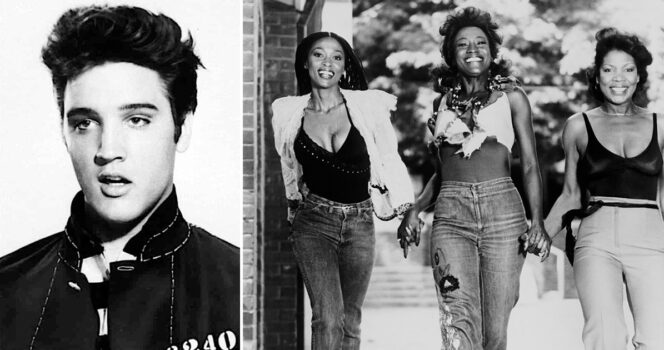
Elvis Presley is widely celebrated as the King of Rock ‘n’ Roll, a cultural icon whose powerful voice and electrifying performances changed the music industry forever. However, beyond his legendary musical talent, Elvis was also a man of principle, standing up for racial equality at a time when segregation and discrimination were still deeply ingrained in American society.
One of the most defining moments of his commitment to justice occurred in 1970, when he was preparing for a highly anticipated concert at the Houston Astrodome. During the planning stages, rodeo officials issued a racial ultimatum—they demanded that Elvis exclude his African-American backing group, The Sweet Inspirations, from the performance. The reason? Pure racial bias.
But Elvis was not a man who caved to injustice. In a bold and unwavering response, he refused to comply, making it clear that if his backing singers weren’t welcome, neither was he. “Well, if they don’t come, I don’t come,” he firmly stated. This simple yet powerful declaration solidified his stance against racism and reinforced his deep sense of loyalty to the people who had supported him throughout his career.
The Sweet Inspirations: A Friendship Beyond Music
The Sweet Inspirations, an exceptionally talented African-American vocal group, had been performing alongside Elvis for years. Led by Myrna Smith, Estelle Brown, and Sylvia Shemwell, and originally founded by Cissy Houston (mother of Whitney Houston), the group brought a distinctive gospel-influenced sound that blended perfectly with Elvis’s dynamic performances.
Though some had initially doubted whether their musical styles would mesh, Elvis immediately embraced them, appreciating their harmonies and their soulful depth. The connection was more than professional—it was genuine friendship and mutual respect. Their collaboration continued through some of Elvis’s most memorable live shows, proving that music had the power to transcend racial barriers.
A Legacy of Integrity and Equality
Despite the controversy, the Houston Astrodome concert went ahead as planned, with Elvis and The Sweet Inspirations performing together as a united front. The show was a massive success—Elvis walked away with a record-breaking $1.2 million, but it was his moral victory that truly left an impact.
Myrna Smith later reflected on her time with Elvis, describing him as more than just a boss—he was family. His respect, kindness, and unwavering support for his bandmates were rare in an era when racial tensions still ran high in the entertainment industry.
Elvis Presley’s decision to stand by his African-American colleagues was not just a singular act of defiance; it was a reflection of his core values. He rejected racism, championed diversity, and demonstrated that music should unite people, not divide them.
His legacy as a musical pioneer is undeniable, but his legacy as a man of integrity, inclusivity, and courage is just as remarkable.

Why This Story Still Matters Today
In today’s world, where issues of racial equality and inclusivity remain relevant, Elvis’s bold stance at the Houston Astrodome serves as an inspiring reminder of how one person’s refusal to bow to injustice can make a difference. His actions weren’t about politics—they were about human decency, friendship, and doing what’s right.
From breaking barriers in music to challenging societal prejudices, Elvis Presley wasn’t just the King of Rock ‘n’ Roll—he was a king in character, too.


